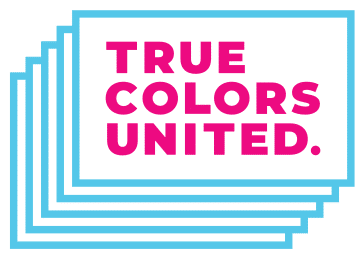
By now, you’ve probably heard of Jesse Helt, the young man who accepted the 2014 Video Music Award (VMA) for Video of the Year on Miley Cyrus’s behalf, stating:
“I am accepting this award on behalf of the 1.6 million runaways and homeless youth in the United States who are starving, lost, and scared for their lives right now. I know this because I am one of these people.”
Needless to say, viewers were taken with the 22 year-old’s words. Many people (ourselves at the True Colors Fund, included) were touched by Jesse’s message and appreciated Cyrus using her celebrity to shed light on the issue.
Since the VMAs, social and traditional media alike have been in a frenzy over the young man, asking who he is, what’s his story, and even questioning his housing status. Well, when you do enough digging, you’re bound to find something. As it turns out, Jesse had been arrested in Oregon at age 18 on charges of criminal mischief, criminal trespass, and burglary – and was wanted in the state for violating his probation. A few weeks ago, Jesse turned himself in to police and posted his bail – and earlier this week, he was sentenced to six months in jail.
Writing for The Advocate, Alan Acosta, Director of Strategic Initiatives at the Los Angeles LGBT Center, offers some valuable insight into situations like Jesse’s:
“Studies have shown that those experiencing homelessness are found to be arrested more often, incarcerated longer, and re-arrested at higher rates than people with stable housing. Think about it: If you don’t have a place to sleep and you find an abandoned building to crash in for the night, you’ve just committed a crime. And if you fail to show up for your hearing and don’t receive notices about your failure to appear because, after all, you’re homeless and don’t have a permanent address, you’ve just committed another crime. It is a cycle that is hard to escape.”
No, we’re not endorsing anything Jesse might have done. We’re simply asking, as Alan is asking, for people to consider the complexities of being young and homeless in America. Because more and more, we’re finding that the real crime is simply not having a home.
The National Law Center on Homelessness & Poverty (NLCHP) has an excellent new report on the issue, which shows that criminalizing homelessness simply doesn’t work as a solution to the problem. First off, it’s costly. On average, American cities spend $87 per day to jail a person and $28 per day to provide them with shelter. Since beginning its 10-year plan to end homelessness in 2005, the state of Utah has saved $5,670 per person annually and reduced its rate of chronic homelessness by 74%. Prioritizing initiatives to end homelessness, rather than sweeping it under the rug, isn’t just cost-effective… it works.
Criminalization simply doesn’t. In fact, as Kathryn shares, it creates barriers for employment, housing, and more:
“One time I was one check away from getting off the streets in Las Vegas and somebody stole all my money. I was staying in a winter shelter at night and they stole my purse with all my money in it. I raised ‘Cain’ about it so [the shelter] threw me out. And when the cops came… they… handcuff[ed] me and told me I was trespassing. So I went to jail for 45 days. I lost that job.”
Legislation is confusing and dense in general, but especially when it comes to homelessness. And laws vary from city to city. That’s why the effort to end criminalization and instead offer real support needs to be waged in our communities as much as it does on Capital Hill. NLCHP’s Criminalizing Crisis: Advocacy Manual is another great resource that can help advocates do just that. An extensive guide for those working to combat criminalization on the ground, the manual contains everything from tests to assess your community’s degree of criminalization, to a breakdown on what behaviors different cities prohibit, to strategies, practices, and procedures for ending criminalization in your city.
We encourage you to read Alan’s full article here (it’s a good one) and to check out NLCHP’s advocacy manual for more guidance on what you can do personally.
And don’t forget to share this story along with your thoughts on Facebook and Twitter!
